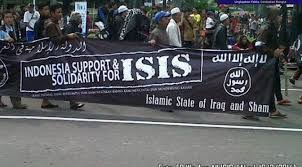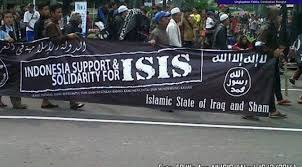
The Islamic State is seeking to establish a “distant caliphate” in Indonesia, “either directly or through surrogates”, believes the Australian attorney-general.
Isis “has identified Indonesia as a location of its ambitions”, said George Brandis, in comments that were made to the Australian media during high-level security meetings in Jakarta between Australian and Indonesian ministers and security officials.
“Isis has ambitions to elevate its presence and level of activity in Indonesia, either directly or through surrogates,” he said.
“You’ve heard the expression the ‘distant caliphate’? Isis has a declared intention to establish caliphates beyond the Middle East, provincial caliphates in effect. It has identified Indonesia as a location of its ambitions,” added Brandis.
The countries – Australia and Indonesia, were “very vulnerable” to terrorism, particularly “Isis-inspired terrorism”, he warned in further remarks.
Isis was not the major Islamist risk in Indonesia, despite comprising the larger part of the approximately 300 foreign fighters who have left the country for the middle east, said Greg Fealey, an expert in Islamism and Indonesian politics from the Australian National University.
“I’m a bit skeptical, Most scholars looking at Isis in south-east Asia and particularly in Indonesia are not convinced that Isis has big plans for Indonesia,” Fealey told Guardian Australia.
“We’ve not seen Isis sending fighters back to Indonesia or Malaysia to undertake terrorist operations ... Nor has there been a statement from IS [Isis] centrally, indicating they would seek to establish a caliphate in south-east Asia or Indonesia,” Fealey added.
He said the small number of foreign fighters who returned to Indonesia had fought with al-Qaeda affiliate Jabhat al-Nusra.
“They do come back, within a year, and they are not interested in terrorism but are interested in using those skills to build an Islamic state,” according to Fealey.
Australia and Indonesia signed a memorandum of understanding on terrorism, among other agreements during a separate meeting between the defense and foreign ministers of the two countries that was held in Sydney.
The two countries could “work together to counter the virulent and violent message that is put out by Isis in the Middle East, particularly over social media,” said the Australian justice minister, Michael Keenan, by the sharing intelligence and policing resources.
The two governments identified cyber-security as a future area of co-operation, apart from foreign fighters.
The internet is “not necessarily changing patterns of recruitment but it is ensuring that Isis propaganda is reaching new audiences” said a report in October based on social media use among Indonesian Isis supporters that was undertaken and formulated by Jakarta-based Institute for Policy Analysis of Conflict (Ipac).
The main factor in prompting the decision to leave Indonesia for distant warzones however still remained the face-to-face recruitment style.
It was necessary to monitor the use of internet by Indonesians for extremist material, the report recommended, excluding convicted terrorists and prisoners from internet and mobile phone usage and the training of intelligence and police officers in cyber-security techniques.
Australia may be able to assist with more sophisticated online operations, like tracking the transfers of overseas funds, even as the Indonesian police are capable of monitoring internet and phone usage, Fealey noted.
“Now that relations have gotten better there’s an element of wanting to ink deals like this, to drive home the point that we have a functional and mutually beneficial relationship,” Fealey said.
(Source:www.theguardian.com)
Isis “has identified Indonesia as a location of its ambitions”, said George Brandis, in comments that were made to the Australian media during high-level security meetings in Jakarta between Australian and Indonesian ministers and security officials.
“Isis has ambitions to elevate its presence and level of activity in Indonesia, either directly or through surrogates,” he said.
“You’ve heard the expression the ‘distant caliphate’? Isis has a declared intention to establish caliphates beyond the Middle East, provincial caliphates in effect. It has identified Indonesia as a location of its ambitions,” added Brandis.
The countries – Australia and Indonesia, were “very vulnerable” to terrorism, particularly “Isis-inspired terrorism”, he warned in further remarks.
Isis was not the major Islamist risk in Indonesia, despite comprising the larger part of the approximately 300 foreign fighters who have left the country for the middle east, said Greg Fealey, an expert in Islamism and Indonesian politics from the Australian National University.
“I’m a bit skeptical, Most scholars looking at Isis in south-east Asia and particularly in Indonesia are not convinced that Isis has big plans for Indonesia,” Fealey told Guardian Australia.
“We’ve not seen Isis sending fighters back to Indonesia or Malaysia to undertake terrorist operations ... Nor has there been a statement from IS [Isis] centrally, indicating they would seek to establish a caliphate in south-east Asia or Indonesia,” Fealey added.
He said the small number of foreign fighters who returned to Indonesia had fought with al-Qaeda affiliate Jabhat al-Nusra.
“They do come back, within a year, and they are not interested in terrorism but are interested in using those skills to build an Islamic state,” according to Fealey.
Australia and Indonesia signed a memorandum of understanding on terrorism, among other agreements during a separate meeting between the defense and foreign ministers of the two countries that was held in Sydney.
The two countries could “work together to counter the virulent and violent message that is put out by Isis in the Middle East, particularly over social media,” said the Australian justice minister, Michael Keenan, by the sharing intelligence and policing resources.
The two governments identified cyber-security as a future area of co-operation, apart from foreign fighters.
The internet is “not necessarily changing patterns of recruitment but it is ensuring that Isis propaganda is reaching new audiences” said a report in October based on social media use among Indonesian Isis supporters that was undertaken and formulated by Jakarta-based Institute for Policy Analysis of Conflict (Ipac).
The main factor in prompting the decision to leave Indonesia for distant warzones however still remained the face-to-face recruitment style.
It was necessary to monitor the use of internet by Indonesians for extremist material, the report recommended, excluding convicted terrorists and prisoners from internet and mobile phone usage and the training of intelligence and police officers in cyber-security techniques.
Australia may be able to assist with more sophisticated online operations, like tracking the transfers of overseas funds, even as the Indonesian police are capable of monitoring internet and phone usage, Fealey noted.
“Now that relations have gotten better there’s an element of wanting to ink deals like this, to drive home the point that we have a functional and mutually beneficial relationship,” Fealey said.
(Source:www.theguardian.com)





